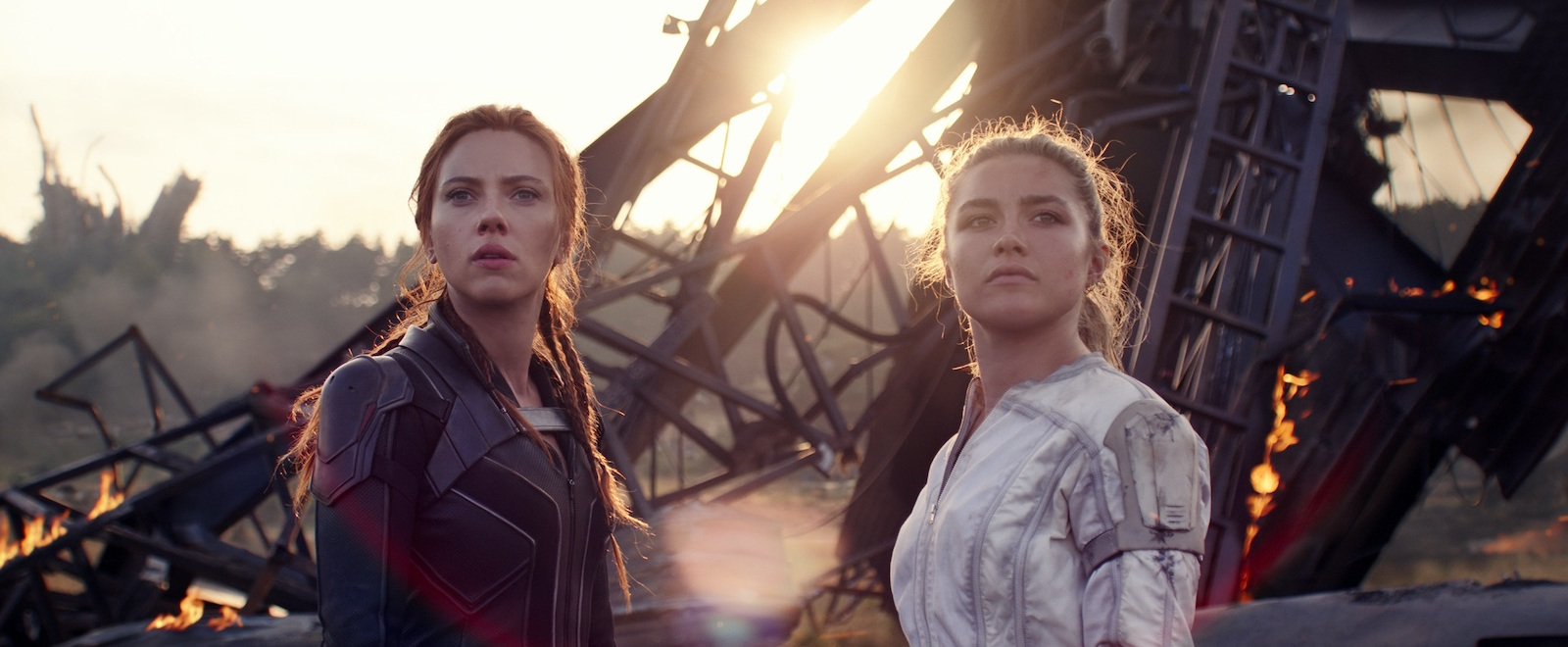How do you make a film about a character whose journey has already concluded? One whom we already know the relative history of? For Marvel Studio’s latest offering, this seemed to be a dilemma for the long-belated solo outing of super-assassin Black Widow, aka Natasha Romanoff (Scarlett Johansson). We know of her treacherous past and the bloody red in her ledger, the redemption she forged as an Avenger, and her ultimate sacrifice for the greater good in the finale Avengers: Endgame. We understand her place and arc in a larger comic book tapestry, but who is (or was) Natasha as an individual, a character predominantly defined by her pain?
What has remained especially and frustratingly opaque are the deeper wounds of Natasha, the remorseful scars embedded into her damaged soul, and, resoundingly, this standalone feature and thrilling interlude, taking place between Captain America: Civil War and Avengers: Infinity War while Natasha is on the lam for violating the Sokovia Accords, is far more invested in her emotional truths than this franchise’s exhaustive mythology. It’s a refreshingly understated enrichment of the character, reminding us there are bountiful, rewarding and, most importantly, grounded stories left to tell on Earth in the Marvel canon (“I doubt that god from space has to take an ibuprofen after a fight”) that can exist alongside, per se, a big, galactic purple man who eradicates half of the universe’s life with the snap of his fingers.
The year is 1995 in Ohio, and everything seems perfectly idyllic in domestic middle America, almost like Spielberg himself had envisioned so many years ago. The warm glow of fireflies paints the summer air as two sisters, a young Natasha (Ever Anderson) and Yelena (Violet McGraw), play outside their beloved home; it’s incredibly lyrical, but their life together is also completely fabricated. This nuclear family is actually not related at all and is a Russian sleeper cell, led by “mother” Melina (Rachel Weisz) and “father” Alexei (David Harbour). These imposters soon are forced to flee to Cuba, where the girls are handed over to the Red Room, a malicious Soviet system that kidnaps, exploits and subjugates young women, turning them into brainwashed assassins.
Black Widow quickly finds its footing in this highly harrowing prologue evocative of real-world human trafficking and only continues its raw, intimate storytelling from there. It’s a distinctly grittier fare for the MCU, told with unflinching candor. Gone are the antiquated depictions of this character, like her hypersexualization in Iron Man 2 or one-dimensional, myopic sterilization arc in Avengers: Age of Ultron. All that remains is director Cate Shortland’s viscerally empathetic gaze: The long-overdue sensibilities of a female director are invaluable here, framing Natasha with an unprecedented sensitivity and grace.
Like other sophisticated Marvel movies, Black Widow cultivates a unique perspective to showcase its comic book plotting, delivering a pulsating, adrenaline-fueled flick with shades of Bourne and Mission: Impossible, emanating with globe-trotting and intrigue in equal measure. Screenwriter Eric Pearson keeps Natasha’s core journey within the parameters of a feature that truly functions on its own terms – and for the better. If a bit spatially sparse, the espionage-flavored action engages with propulsive choreography and acrobatics as bones crunch and bullets whizz.
For all the theatrics, though, Shortland understands that the substance of Black Widow – both the film and character – lies within the pathos, carefully nurturing the story’s emotional threads above the spectacle. At its center, this is about Natasha and company healing in the face of trauma as an adult Yelena (Florence Pugh), freshly liberated from the Red Room, lures Natasha into helping her eradicate the program and its insidious leader Dreykov (Ray Winstone) once and for all, freeing their fellow Widows from their shared abuser. One cannot help but think of the #MeToo movement as these women supportively unify to address the grief afflicted onto them by an oppressive patriarchal system.
Natasha and Yelena also reunite with Weisz – prickly and tender – as Melina and Harbour – rambunctious and slightly endearing – as Alexei/Red Guardian (a disaffected Soviet Captain America knockoff) to complete their mission, and they all must come to terms with their tribulations and transgressions, including the ones against each other. It’s surprisingly a stirring look into the rectifying connection we make with people in the wake of personal destruction. A dinner scene that preludes the third act with this reassembled “family” particularly bears nuanced insights: Don’t be mistaken by the people clad in superhero suits discussing the computerized subjugation of pigs.
“It was real to me,” a tear-stricken Yelena poignantly laments of her falsely picturesque, fractured childhood, composed of family dinners and “American Pie” on the station wagon stereo, that was confiscated from her and replaced with pain and sorrow. Little Women and Midsommar star Florence Pugh’s magnetic and captivating performance as Natasha’s younger sister is a highlight of the film and matches Johansson’s dramatic prowess, crafting a precocious, fiery young woman with a searing tragedy beneath her surface. Yelena’s dynamic with Natasha not only encapsulates the universal compassion and resiliency between two sisters but also fills in the deeper emotional touchstones that have been missing for Natasha in the MCU.
Even as the third act becomes cluttered and narratively convoluted, seeing the titular Black Widow finally face the traumatic past she has been evading for the latter half of her life, along with picking up the pieces with her makeshift family, is unmistakably cathartic. The occasionally generic CGI effects simply cannot undermine the explosive tact Shortland and Johansson employ as it dissects the intricacies of female identity and autonomy – warts and all. Black Widow may not be the most innovative MCU movie, but it certainly is one of their most human and resonant.
Grade: B+
Black Widow is now available on DVD and Disney+.
Photo Credit / Disney


